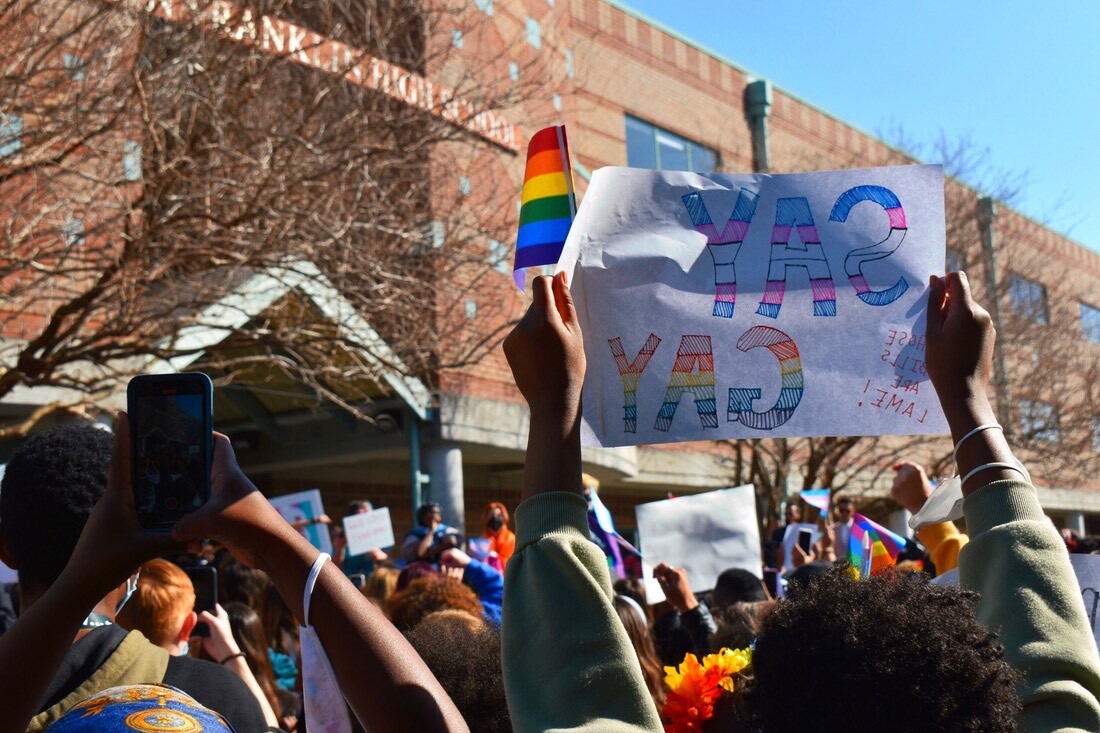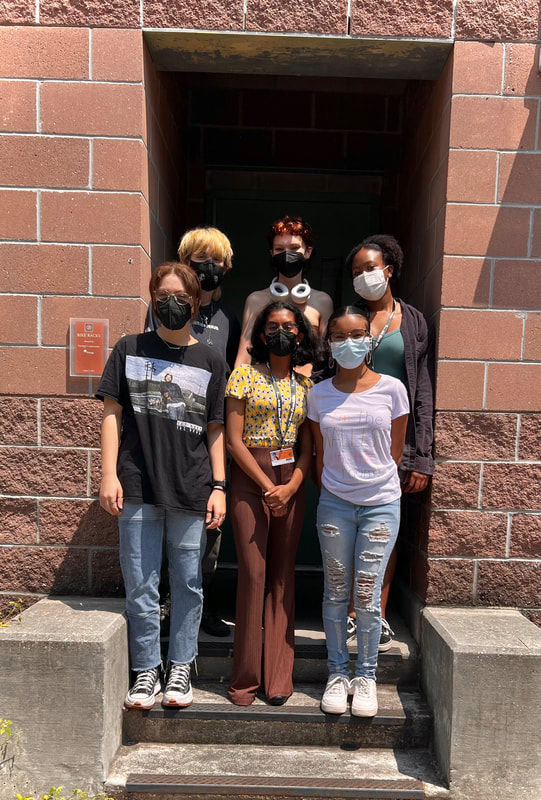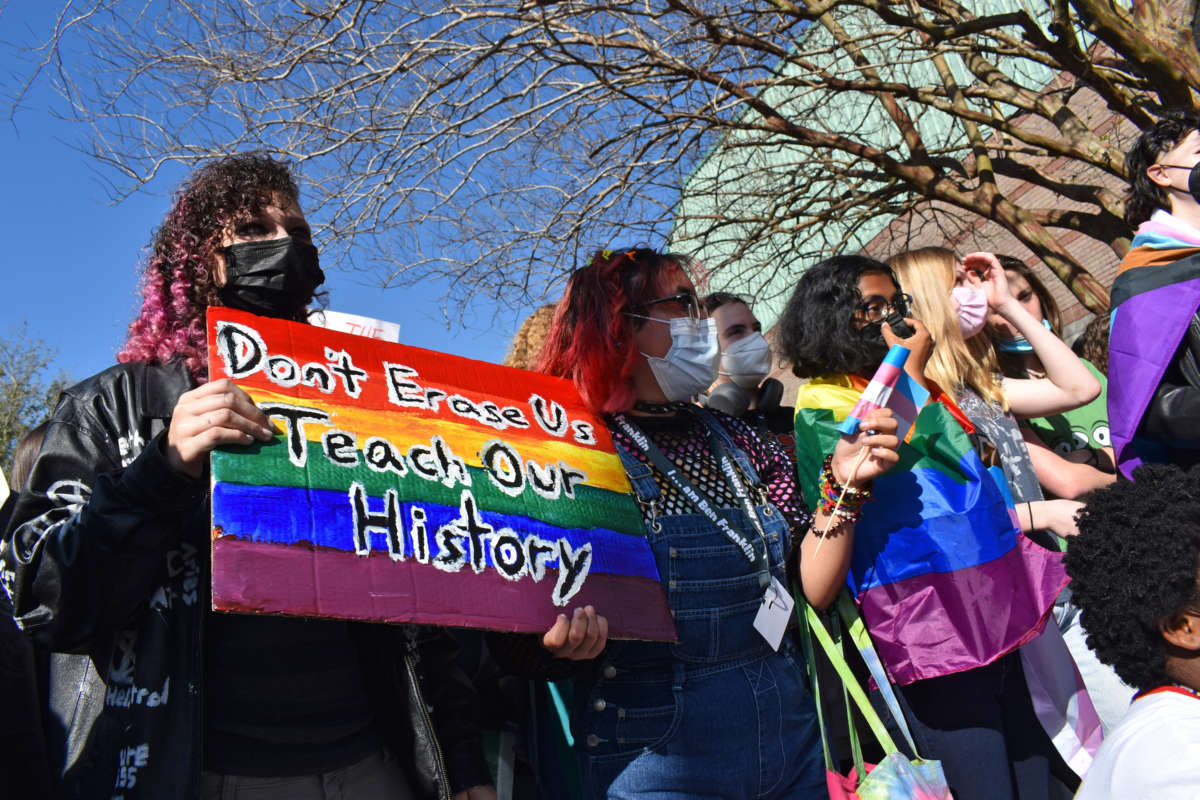For members of the Gender and Sexuality Alliance at Benjamin Franklin High School in New Orleans, Louisiana, the tirade of anti-trans and anti-LGBTQ bills upending state legislatures is a dangerous reaction to what they’ve worked so hard to build: visibility and safety for LGBTQ students. Gathered in the student union at the University of New Orleans, five members of the alliance described what it’s like to grow up queer in southern Louisiana — and then face down legislation that seems to attack their very right to exist at school.
Jackson Downey, the lone senior in the crew of activists, has served as a point person for LGBTQ rights at the high school after enduring homophobic attacks in middle school and moving across the country in search of a safer place to learn. Unlike previous schools Downey attended, Benjamin Franklin High has diversity and inclusion policies, but LGBTQ students must routinely push administrators to put these policies into action. When questions come up about dead names or gender-neutral bathrooms, administrators look to Downey for guidance. State lawmakers are now targeting LGBTQ teachers and students with “Don’t Say Gay and Trans” legislation that threatens to undo the school’s progress.
“To fight so hard to have my own rights [at school], and then to see them announce those bills, and then watch those bills get passed,” Downey said, their voice rising. “It brought me back to being 12 years old, realizing I have a crush on my best friend and thinking ‘God’s going to hate me for the rest of my life. There’s nothing left for me.’”
Anti-racist and LGBTQ youth across the country are organizing in school hallways and online to resist the onslaught of Republican attempts to ban gender-affirming health care and silence any discussion of racism and LGBTQ identities in public schools. The most notorious “Don’t Say Gay and Trans” bill passed into law in Florida and is being challenged by queer students in court. When a copycat bill was introduced in Louisiana along with a bill targeting trans athletes, which passed the Louisiana Senate, the activists at Benjamin Franklin High organized a dramatic school walkout that made headlines across the state.
“It finally reignited the spark in myself, like once the legislation hit,” said Grayson Swearingen, a junior at Benjamin Franklin High. “Because I had already built up this really angry tiredness at everything happening in Franklin, and once I saw it in the news, it just made me so angry, and I literally came to lunch and sat down, and I went, ‘Can somebody please help me organize a protest?'”

Students are also gathering online to share strategies and links to queer books and anti-racist essays that conservative parents have banned from school libraries nationwide, according to organizer and graduating senior Reagan Peters-Roussell. Peters-Roussell founded the Better Future Program, which provides an expansive online “liberation library” of social justice literature for free. For a growing network of students across multiple states, sharing books is both about knowledge and solidarity.
“My school currently, they aren’t banning any books, and we are really lucky about that,” Peters-Roussell told Truthout. “But I know we have books banned at other schools in our resources.”
Students are also are demanding — and even building — curriculums examining Black and LGBTQ history that would be the explicit targets of legislation attacking queer visibility and “critical race theory,” the right-wing bogeyman that wrongly conflates history class with “Marxist indoctrination.” Meanwhile, the LGBTQ youth advocacy group Trevor Project reports that 94 percent of young LGBTQ people say “recent politics” negatively impacted their mental health.
In what civil rights groups call an “unprecedented” move, Republican state lawmakers in Louisiana’s House resurrected failed legislation last week that would go further than Florida’s “Don’t Say Gay” law and ban discussion of sexual orientation and gender identity in grades K-8. Civil rights groups say the bill would silence LGBTQ educators while making queer students invisible by preventing adults from offering guidance if a bully is hurling insults or LGBTQ identities come up in class. In the South and across the country, LGBTQ teachers are already facing reprimand for doing just that.
“Bills like Louisiana’s ‘Don’t Say Gay or Trans’ legislation are a shameful attack on students who are already struggling with the weight of discrimination and isolation,” said Sarah Warbelow, legal director at the Human Rights Campaign, in a statement.

Most of the Benjamin Franklin High students said they have experienced racist, transphobic and homophobic language from fellow students, especially if they came out in middle school. Swearingen and another Benjamin Franklin student, Croix Hill, have fond memories of gay teachers in middle school — the same teachers targeted by the “Don’t’ Say Gay” bill that opponents argue is an implicit double standard for queer and straight teachers. For Swearingen, having an adult to talk to after being one the first kids to come out as queer and trans in his school was indispensable. Hill remembers a choir teacher who helped them realize that homophobic jokes hurt real people, a lesson that kept Hill from internalizing homophobia around them before coming out as bisexual in high school.
“It’s so nice to be able to talk to somebody about those sorts of things and understand it and to be exposed to like, you know, queerness,” said Hill, who previously attended a private school where LGBTQ identity was rarely discussed. “It’s really important, I think for children, because I literally didn’t know what being gay was.”
Many LGBTQ people remember teachers who challenged homophobia and made them feel safe at school, and now these educators are precisely who are under attack. Republicans are implying, if not saying directly, that LGBTQ teachers and “extremists” are “grooming” children, an age-old and hateful trope about adults preying on young people.
Arguing that LGBTQ adults are implicitly more dangerous than straight adults is extremely homophobic and transphobic, but conspiracy theories are now central to GOP rhetoric, and anything that feeds fears about changing demographics and LGBTQ visibility is red meat for Republicans following in the footsteps of former President Donald Trump. With help from the right-wing media, they are turning public schools where kids of different backgrounds and identities mingle into ideological battlegrounds. At the heart of this so-called “parental rights” movement is a desire to undermine and privatize public education that traces its roots to conservative backlash against the desegregation of public schools decades ago.
“They want to keep it under wraps, people don’t want to see queer joy and trans joy,” said Benjamin Franklin High sophomore Vale Tesch. “Trans joy is resistance.”
Naika Belizaire, an organizer and senior graduating at Advanced Technologies Academy in Las Vegas, Nevada, is no stranger to this fight. Belizaire recalls a history teacher who skipped over the Haitian revolution and said “nobody cares” about the first successful rebellion against the trans-Atlantic slave trade. A different teacher disciplined Belizaire for wearing an afro to school, and she narrowly avoided disciplinary action by protesting the dress code. These experiences inspired Belizaire to confront anti-Black racism within education. At the age of 16, Belizaire asked the school to introduce a Black history course or at least provide lessons from a diversity of perspectives, but she only received lip service as administrators dragged their feet.
“I basically talked to my principal, and although he was very against it at first, I convinced him by creating a petition, rallying potential teachers to teach the class, and drafting a syllabus,” Belizaire said in an interview. “He can’t say ‘no’ if I have everything ready.”
The proposal for a Black history class quickly drew backlash from conservative parents fed a right-wing media diet of hysteria over critical race theory. Board meetings for schools across Nevada and the country were filling with angry MAGA supporters who believe an advanced legal theory about systemic racism would be taught to their kids. At a board meeting Belizaire attended, white parents essentially argued for school segregation, with one father saying he refused to send his son to a school that “puts down” white people. Belizaire said parents had a complete misconception of Black history, but some people don’t want to learn about Black history in the first place.
“For some reason Black history was equivalent to critical race theory in their minds,” Belizaire said. “It got a little extreme at parts, but we fight through every day to make sure our voices are heard and our movement is heard.”
Belizaire’s school provided a course on Black history for the first time this year, and Belizaire was wrapping up the class ahead of graduation when reached for an interview last week. Belizaire also worked with State Sen. Dina Neal to successfully pass the CROWN Act, which prohibits discrimination against Black and Brown students who wear natural hair styles such as afros. Nevada’s governor signed the bill last year, and advocates are pushing similar legislation in Louisiana, Congress and across the country. This summer Belizaire is organizing a mentorship and restorative justice program for femmes and girls of color.
Back in New Orleans, the Gender and Sexuality Alliance is wrapping up a fundraiser that raised $1,000 to purchase a chest binder for any student who wants one. The students are quick to point out that, despite some problematic teachers and a lack of certain accommodations, Benjamin Franklin High is better funded and safer for LGBTQ students than other schools in southern Louisiana. Roughly half the student body and a number of teachers joined their walkout against the anti-LGBTQ bills in the statehouse, and while homophobic and transphobic comments can still be heard in the halls, such talk is generally frowned upon by a majority of students in one of the city’s most diverse schools.
Surely they have it easier than past generations, the students said. The HIV/AIDS crisis is not what it used to be, and gay marriage has been legal for much of their lives. LGBTQ rights and visibility has advanced rapidly, especially online, which is probably one reason why conservatives are lashing out at queer students and teachers. Yet the anti-LGBTQ and anti-trans legislation in Louisiana, Florida, and beyond is proof that hard-won rights can easily be taken away, even if the bills fail to pass or are eventually struck down in court. LGBTQ students realize they must fight for these rights with everything they’ve got, just like the generations before them.
“I want to be an animator; I didn’t want to be an activist, but I have to fight for my rights,” Swearingen said. “I want to be a creator, but I have to fight for my right to create.”
Join us in defending the truth before it’s too late
The future of independent journalism is uncertain, and the consequences of losing it are too grave to ignore. To ensure Truthout remains safe, strong, and free, we need to raise $43,000 in the next 6 days. Every dollar raised goes directly toward the costs of producing news you can trust.
Please give what you can — because by supporting us with a tax-deductible donation, you’re not just preserving a source of news, you’re helping to safeguard what’s left of our democracy.
